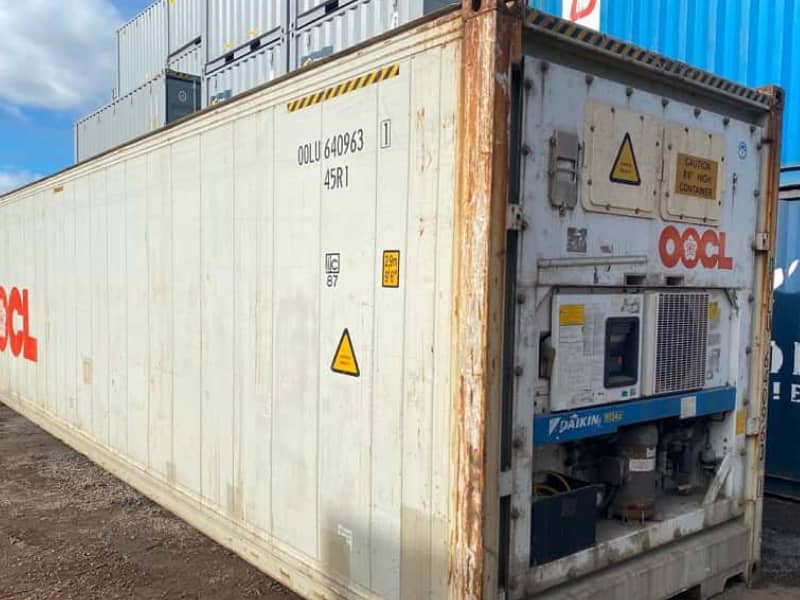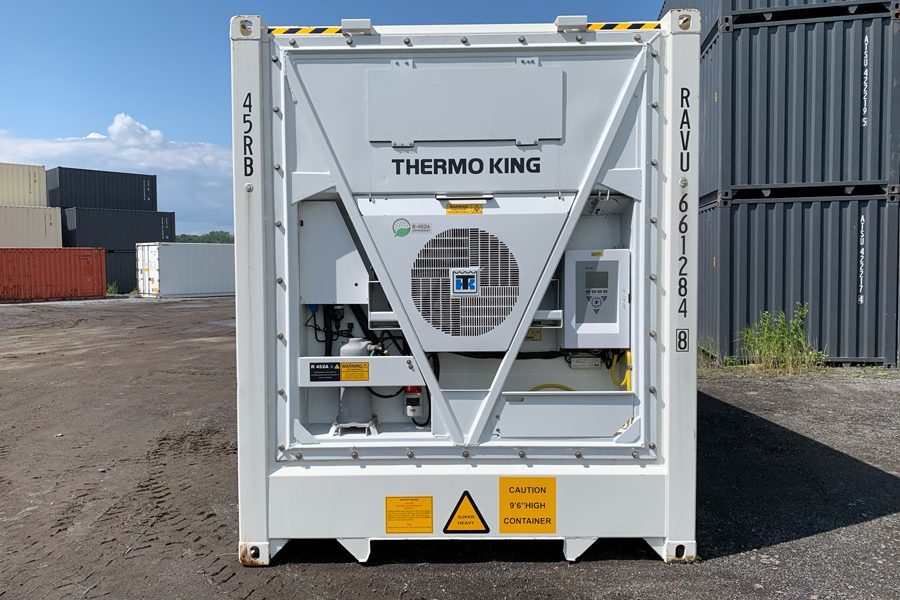Invest in affordable used 40ft refrigerated shipping containers for storage
All Concerning Freezer Containers: Necessary Insights for Your Storage Requirements
Cold store containers play a crucial function in the conservation of disposable items. They can be found in numerous forms, consisting of cooled and shielded units, each made for particular storage needs. Recognizing the benefits and key attributes of these containers is vital for organizations aiming to optimize their procedures. As the need for reliable storage space services expands, discovering the various choices offered can cause notified decisions that influence both earnings and sustainability. What variables should one think about when choosing the best container?
Kinds of Freezer Containers
Freezer containers can be found in various types, each created to meet particular temperature control demands. Among the most common kinds are cooled containers, which preserve temperatures in between 0 ° C to 10 ° C, making them appropriate for disposable items like fruits, veggies, and milk products. One more kind is the deep freezer container, which operates at temperature levels below -18 ° C, perfect for long-term storage of icy products such as meats and fish and shellfish.
Insulated containers provide temperature level stability without active air conditioning, making them beneficial for short-term transportation of temperature-sensitive products. Furthermore, there are mobile cold store devices, which supply versatility in areas and are usually made use of in occasions or seasonal procedures. Blast chillers quickly lower the temperature level of warm foods, making sure security and quality. Each kind offers a special purpose in various sectors, from food solution to pharmaceuticals, stressing the importance of selecting the best container for particular storage space demands.

Benefits of Using Cold Storage Solutions

Furthermore, cool storage space options extend the service life of products, decreasing waste and increasing profitability for organizations. By efficiently taking care of inventory with proper temperature control, firms can optimize their supply chains and improve functional performance.
Furthermore, cold store centers permit for adaptable storage options, accommodating various volume requirements and seasonal fluctuations popular (used 40ft refrigerated shipping containers). This flexibility aids businesses respond rapidly to market changes
Employing cool storage options can ensure compliance with wellness and security laws, protecting both customers and companies. Generally, the tactical use freezer improves product monitoring while advertising sustainability and financial viability.
Key Functions to Look for in Cold Store Containers
When choosing cold store containers, numerous vital features value mindful consideration to secure peak efficiency and integrity. Temperature level control capabilities are necessary; containers need to keep constant temperatures ideal for specific products. Insulation top quality additionally plays a significant function, as superior insulation minimizes power usage and enhances temperature stability.
Next, ease of gain access to and loading is crucial; containers ought to offer user-friendly styles for efficient handling and company. Sturdiness is one more crucial facet; weather-resistant products assure long life and protect contents versus environmental factors.
In addition, wheelchair attributes, such as built-in wheels or raising factors, help with transport, while adjustable designs enable tailored storage remedies.
Last but not least, keeping track of systems, consisting of temperature alarms and remote tracking, give real-time updates, ensuring that problems stay suitable. By concentrating on these attributes, users can pick chilly storage containers that satisfy their functional demands efficiently.
Picking the Right Cold Storage Container for Your Requirements
Selecting the appropriate freezer container needs a thoughtful evaluation of operational needs and certain demands. Factors such as the sort of products being saved, temperature level sensitivity, and volume ought to be prioritized. Subject to spoiling food things might necessitate containers with stringent temperature level controls, while pharmaceuticals may require specific conditions to preserve effectiveness.
Additionally, prospective individuals ought to think about the container's size and movement. A bigger device might be needed for mass storage, while smaller, portable choices can be optimal for on-site or short-term needs. Insulation top quality and energy efficiency are likewise essential, as these will influence operational costs and temperature level stability.
Lastly, compliance with market regulations and criteria is crucial, specifically in fields like food and medical care. By very carefully examining these elements, individuals can pick a cold store container that effectively fulfills their distinct needs and guarantees ideal storage problems.
Finest Practices for Preserving Cold Store Issues
Maintaining excellent freezer problems read more is crucial for preserving the high quality and safety and security of temperature-sensitive items. Regularly keeping an eye on temperature and moisture levels is critical; utilizing trusted digital thermostats and hygrometers can offer exact readings. Correct insulation of cold storage containers helps lessen temperature changes and energy loss.
Executing a first-in, first-out (FIFO) system ensures that older stock is utilized before newer supply, reducing waste (used 40ft refrigerated shipping containers). In addition, preserving an organized design within the storage room enables better air flow and lessens the danger of cross-contamination
Regular upkeep look at devices, such as compressors and seals, are very important to avoid malfunctions. Staff training on finest methods for filling and unloading items helps keep temperature honesty. Maintaining doors shut as much as possible restrictions heat exchange, ensuring that the cold storage space setting stays effective and stable in preserving important items.
Cost Considerations for Cold Storage Solutions
When examining cool storage space services, it is crucial to think about the first financial investment expenses along with continuous functional expenses. A thorough failure of these expenses can expose significant lasting cost savings potential for businesses. Recognizing these economic aspects aids stakeholders make informed choices regarding their freezer demands.

First Investment Costs
The monetary landscape of cold storage space containers presents various initial investment costs that organizations should consider. These costs commonly consist of the purchase or rental cost of the containers, which can vary based upon dimension, insulation, and type top quality. Furthermore, expenses associated with retrofitting existing frameworks to fit cold store needs to be factored in, particularly if specialized tools is required. Installation expenses, including electrical job and refrigeration systems, additionally add to the overall first investment. Services should not overlook transportation costs for providing containers to their wanted area. Possible personalization options, such as shelving or temperature monitoring systems, can additionally influence the initial economic investment. Careful budgeting for these variables is essential for successful cool storage space implementation.
Operational Costs Failure
Operational expenses for freezer remedies incorporate a number of critical cost factors to consider that businesses should navigate. Trick factors include energy expenses, which can be considerable due to the demand to preserve reduced temperature levels. Maintenance expenses are also significant, as regular maintenance is vital to ensure tools operates effectively and remains compliant with health and wellness and safety and security standards. Additionally, labor prices might emerge from the need for specialized personnel to check the storage and handle atmosphere. Insurance coverage costs are an additional factor to consider, as business have to protect their financial investments against prospective losses. Lastly, any kind of potential governing conformity costs should be factored in, as businesses might require to purchase systems that adhere to food security and ecological regulations. Understanding these expenses is vital for effective budgeting.
Long-Term Cost Savings Prospective
Purchasing freezer services offers substantial long-lasting cost savings potential, changing first expenses into financial efficiency gradually. By decreasing wasting and waste, businesses can improve their earnings margins significantly. Advanced insulation and energy-efficient systems minimize energy prices, which gather over the life-span of the equipment. Chilly storage space containers often need much less frequent upkeep compared to standard refrigeration techniques, leading to reduced fixing expenditures. The ability to shop products for extensive durations without compromising quality enables services to exploit on market variations, maximizing income. In addition, the scalability of chilly storage remedies allows business to adjust to changing needs without sustaining too much expenses. On the whole, these factors contribute to an engaging case for cold storage as an affordable investment strategy.
Regularly Asked Concerns
For How Long Can Food Be Saved in Freezer Containers?
The period food can be saved in freezer containers differs by type. Usually, perishable products last from days to weeks, while icy foods can remain safe for months, depending upon appropriate temperature and storage space conditions.
Are Freezer Containers Energy-saving?
The power effectiveness of cold storage space containers varies based upon layout and insulation top quality. Modern units typically use sophisticated modern technology to lessen power consumption, eventually contributing to reduced functional prices and ecological impact in lasting use.
Can Cold Storage Containers Be Personalized for Particular Needs?
Freezer containers can indeed be personalized to fulfill specific demands. Modifications may include temperature level controls, dimension adjustments, and added features, permitting users to customize services effectively for various storage space requirements and operational choices.
What Are the Typical Dimensions of Cold Store Containers?
Cold store containers typically come in conventional sizes such as 10, 20, and 40 feet. These dimensions suit numerous storage demands, making sure versatility for companies needing temperature-controlled environments for subject to spoiling goods or delicate materials.
Do Freezer Containers Require Unique Licenses for Use?
Cold store containers typically need special permits for usage, relying on local regulations and planned applications. Authorities may mandate authorizations to ensure security requirements, ecological compliance, and proper operational methods are maintained during their utilization.
Cold storage space containers come in various types, each developed to fulfill certain temperature control demands. Additionally, cool storage space centers allow for flexible storage space choices, accommodating numerous volume needs and seasonal fluctuations in demand. Selecting the best cool storage space container requires a thoughtful evaluation of specific needs and functional demands. The financial landscape of chilly storage space containers provides various preliminary investment prices that companies must think about. Cold storage containers can certainly be customized to meet details demands.